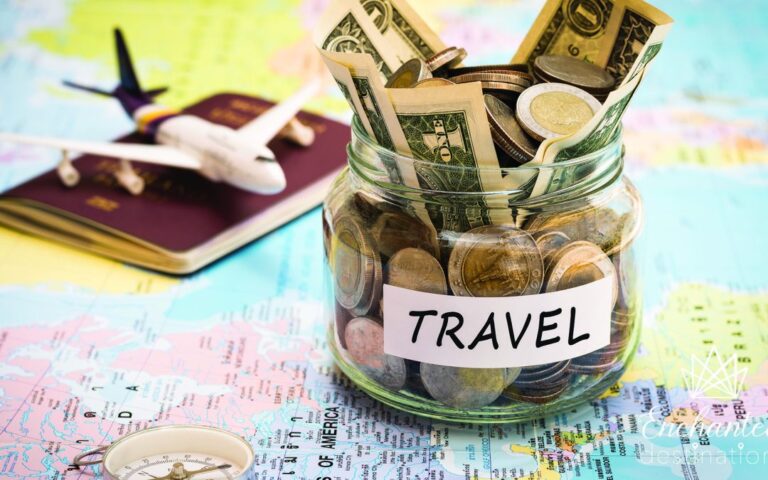Are you dreaming of exploring new destinations but worried about the cost? Fear not! This comprehensive guide on traveling on a budget will show you how to embark on exciting adventures without breaking the bank. Whether you’re a seasoned traveler or a newbie looking to explore the world economically, this article has got you covered.
Calculating Your Travel Budget
When it comes to setting a travel budget, there are two main categories of expenses you need to consider:
1. Fixed Expenses (Flights, Accommodation, Transportation)
Fixed expenses are the non-negotiable costs that form the foundation of your travel budget. These include expenses like:
Flights:
Start by researching flight options and booking well in advance to secure the best deals. Keep an eye out for promotions and discounts offered by airlines.
Accommodation:
Consider your accommodation preferences, whether it’s a luxury hotel, budget-friendly hostel, or a vacation rental. Websites and apps like Airbnb and Booking.com can help you find affordable options.
Transportation:
Factor in the cost of getting around your destination, including public transportation, car rentals, or taxis. Research transportation options to choose the most cost-effective ones.
2. Variable Expenses (Food, Activities, Souvenirs)
Variable expenses are the costs that can vary widely based on your choices during your trip. These include:
Food:
Dining out at restaurants can be a significant expense while traveling. Consider mixing in budget-friendly meals at local eateries and street food stalls to save money.
Activities:
Plan your activities and excursions in advance to get a better idea of their costs. Look for free or low-cost attractions and prioritize the experiences that matter most to you.
Souvenirs:
While it’s tempting to bring back mementos from your trip, be mindful of your budget when shopping for souvenirs. Set a spending limit to avoid overspending.

Tips for Creating a Realistic Budget
Creating a realistic travel budget involves careful planning and consideration. Here are some tips to help you stay on track:
1. Research Destination Costs
Before finalizing your budget, research the average costs associated with your chosen destination. Take into account factors like currency exchange rates, the cost of living, and typical expenses for travelers in that area. This will give you a better understanding of what to expect.
2. Consider Off-Peak Travel
Traveling during the off-peak season can lead to significant savings on accommodation and other expenses. Plus, you’ll likely encounter fewer crowds and enjoy a more peaceful experience. Be flexible with your travel dates to take advantage of these cost-saving opportunities.
3. Use Budgeting Apps and Tools
In the digital age, there are numerous budgeting apps and tools available to help you plan and track your expenses while traveling. Consider using apps like Mint, YNAB (You Need A Budget), or travel-specific apps to keep tabs on your spending in real-time.
Traveling on a Budget Tips and Tricks for Affordable Adventures
Exploring Different Accommodation Options
When planning a trip, finding affordable accommodation is often a top priority for budget-conscious travelers. Fortunately, there are various accommodation options to consider that can help you save money without compromising on comfort or safety.
Hostels:
Hostels are a popular choice for budget travelers. They offer dormitory-style rooms with shared facilities, making them significantly cheaper than hotels. Many hostels also provide private rooms for those who seek more privacy while still keeping costs down. Hostels are a great way to meet fellow travelers and often have communal spaces for socializing.
Airbnb:
Airbnb has revolutionized the way people find accommodation. It allows you to rent a room, apartment, or even an entire house from locals. Airbnb offers a wide range of options to fit different budgets, and you can often find more affordable options compared to traditional hotels. Plus, you can enjoy the comforts of a home away from home.
Couchsurfing:
If you’re looking for a unique and cost-effective way to stay, consider Couchsurfing. This platform connects travelers with hosts who offer free accommodations on their couches or spare rooms. While it’s essential to prioritize safety and carefully vet your potential hosts, Couchsurfing can lead to incredible cultural experiences and lifelong friendships.
Booking Strategies for Lower Accommodation Costs
Once you’ve decided on the type of accommodation that suits your budget, there are several strategies you can employ to secure even more affordable stays.
Discounts and Deals:
Always keep an eye out for discounts and deals on accommodation websites. Many hotels, hostels, and even Airbnb hosts offer promotions during off-peak seasons or for longer stays. Additionally, you can use websites and apps that aggregate deals and promo codes to find the best prices.
Loyalty Programs:
Join loyalty programs offered by hotel chains and booking platforms. Accumulating points can lead to significant discounts, free nights, or exclusive offers. These programs often provide additional perks like complimentary upgrades, early check-ins, or late check-outs.
Last-Minute Bookings:
If you have a flexible schedule, consider booking your accommodation at the last minute. Hotels and Airbnb hosts may reduce their prices to fill empty rooms or rentals. Apps like HotelTonight specialize in offering discounted rates for same-day or next-day bookings.
Booking Affordable Flights
Flexible Travel Dates:
One of the key strategies to booking affordable flights is maintaining flexibility in your travel dates. Airline ticket prices fluctuate based on demand, so if you can adjust your travel schedule to avoid peak times, you can often find cheaper options. Consider traveling mid-week or during off-peak seasons to score significant savings. Use flexible date search features on airline websites to pinpoint the best deals.
Comparison Websites:
Harness the power of comparison websites to unearth the best flight deals. Websites like Skyscanner, Kayak, and Google Flights allow you to compare prices from multiple airlines and travel agencies, helping you identify the most economical options quickly. These platforms often offer fare prediction tools and alerts, ensuring you stay updated on price drops and promotions.
Budget Airlines:
Budget airlines have gained popularity for providing affordable travel options. While they may not offer the same level of luxury as major carriers, they excel in cost savings. Keep in mind that budget airlines typically charge extra for add-ons like checked baggage and in-flight meals, so carefully read the fine print before booking. Some well-known budget airlines include Ryanair, Spirit Airlines, and easyJet.
Economical Local Transportation
Public Transport:
When exploring a new city or navigating your daily commute, public transportation is often the most cost-effective option. Utilize buses, trams, subways, and trains to get around affordably. Many cities offer multi-day or weekly passes that provide excellent value for money, allowing unlimited travel within a specified timeframe. Public transportation not only saves you money but also offers an authentic local experience.
Biking and Walking:
For shorter distances and urban exploration, consider biking or walking. Rent a bicycle or use bike-sharing services available in many cities. Walking allows you to discover hidden gems, save on transportation costs, and promote a healthy lifestyle. It’s an eco-friendly and wallet-friendly way to get from point A to point B.
Ride-Sharing and Carpooling Apps:
In the age of smartphones, ride-sharing and carpooling apps have revolutionized the way people travel. Apps like Uber, Lyft, and BlaBlaCar connect riders with drivers, making transportation both convenient and economical. Carpooling not only reduces individual transportation costs but also contributes to reducing traffic congestion and carbon emissions.
Dining options on a budget
Street Food and Local Markets
When it comes to saving on food expenses, one of the most delightful options is indulging in street food and exploring local markets. Not only does this give you a chance to savor authentic flavors, but it also won’t put a dent in your wallet. Street food vendors often offer a variety of tasty dishes at incredibly affordable prices. From mouthwatering tacos in Mexico to savory kebabs in Istanbul, street food allows you to experience the essence of a culture without the hefty price tag. Be sure to follow basic hygiene practices, and you’ll enjoy a safe and cost-effective culinary adventure.
Affordable Eateries
Affordable eateries, often referred to as mom-and-pop restaurants or local diners, are hidden gems for budget-conscious diners. These establishments offer hearty meals at reasonable prices, and their menus are usually filled with comfort food that will satisfy your cravings without emptying your wallet. Look for small, family-owned restaurants in your area or ask locals for recommendations. You’ll not only save money but also support local businesses in the process.
Cooking Your Meals (When Feasible)
One of the most effective ways to save on food expenses is by preparing your meals at home. Cooking not only allows you to control your ingredients but also encourages healthier eating habits. Plan your weekly menu, buy ingredients in bulk, and cook in batches to reduce costs further. While dining out can be a treat, cooking at home is a practical and budget-friendly option that adds up to significant savings over time.
Strategies for Eating Out Without Breaking the Bank
Set a Daily Food Budget
To avoid overspending when eating out, it’s crucial to set a daily food budget. Determine how much you’re willing to spend on meals for the day and stick to it. This will help you make informed choices when selecting restaurants and dishes. Apps and budgeting tools can assist in tracking your expenses and ensuring you stay within your allocated budget.
Share Meals
Another smart strategy to save money while dining out is sharing meals. Many restaurants serve generous portions that can easily be split between two or more people. This not only reduces your food costs but also minimizes food waste. Additionally, sharing meals allows you to try a variety of dishes and experience more of the local cuisine without the added expense.
Opt for Lunch Specials
Choosing to dine out for lunch instead of dinner can significantly cut down your food expenses. Many restaurants offer lunch specials that include similar dishes as their dinner menu but at a fraction of the cost. Lunchtime deals are a fantastic way to enjoy the same quality of food at a more affordable price.
FAQ:
How can I save on flights?
Finding affordable flights requires flexibility in your travel dates and destinations. Utilize fare comparison websites and sign up for fare alerts to snag the best deals.
What is the best time to book accommodation for savings?
Booking accommodation well in advance can lead to substantial savings. Additionally, consider mid-week stays and off-peak seasons for better rates.
What should I pack for a budget trip?
Pack light and smart. Include versatile clothing items and essentials like a reusable water bottle and a power bank to avoid unnecessary expenses on the road.
Are travel rewards programs worth it for budget travelers?
Yes, many travel rewards programs offer perks like free stays and airline miles, which can significantly reduce your travel costs.
How can I avoid overspending during my trip?
Set a daily spending limit and track your expenses using budgeting apps. This will help you stay on top of your finances and ensure you don’t overspend.
What are some hidden gems for budget travelers?
Research your destination thoroughly to find hidden gems like local markets and lesser-known attractions that offer unique experiences at lower costs.
Conclusion
Traveling on a budget is not just about saving money; it’s about making the most of your journey while being financially responsible. By following the tips and insights in this guide, you can embark on affordable adventures that create lasting memories. So, pack your bags, plan your budget, and get ready for the adventure of a lifetime without breaking the bank!
UP NEXT
Culinary Tourism: Exploring the World’s Flavors and Food Destinations
Solo Travel Adventures: Exploring the World on Your Own



